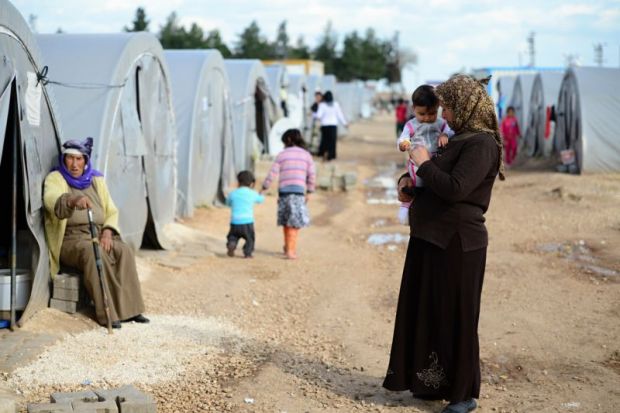The emergence of new conflicts, together with the increasing duration of existing displacement crises, implies that forced displacement is set to increase. When it does, the need for employment opportunities for forcibly displaced people will do so proportionally. The World Bankestimatesthat, by 2030, the majority of the world’s extreme poor, which includes a large proportion of displaced people, will live in fragile and conflict affected states – so job creation in fragile settings has the significant potential to address poverty.
Displacement crises can benefit host economies
Large scale displacement produces an expansionary effect – there are more people and money in the same geographical area, according to Paolo Verme, a lead economist with the World Bank. Evidence from aresearch programthat he leads found that, in 70 to 80 percent of the results from different countries and contexts,forced displacement has either a positive or non-significant effect on employment or wages of host communities. In more than 50 percent of cases, there are positive wellbeing results for host community households, indicating that they benefit from the presence of the forcibly displaced. Negative labor market effects were only found in a minority of cases.
This is also true for high- and middle-income countries. The inflow of asylum seekers to Germany between 2015 and 2016 didn’t negatively affect host workers. In fact, within five years, many of them had integrated faster than previous influxes and the financial cost to the German Government was likely recovered in taxes sooner than anticipated.
However, theinflow of Syrian refuges in Türkiyeand awave of migration from Venezuelato Ecuador negatively impacted young, less-educated workers in both labor markets, which poses the question, how can we ensure that displaced people are provided with job opportunities while maintaining the conditions of native workers?
READ ALSO:
- NDLEA Razes Cannabis Warehouse, Arrests Four in Edo
- Ebubeagu Commander,Two Others Shot Dead By Gunmen in Ebonyi
- Police Rescue Two of Six Pupils Abducted in Nasarawa State
Changing how we think about work
The first thing that we need to change is the way that we describe displaced populations. “When we think about nationals, skills-enhancing programs such as training and education are considered public investments. When we think about displaced populations, they are considered a public cost. We need to see educating displaced people as a public investment in human capital,” says Verme.
More often than not, populations displaced by conflict are seen as a liability, not an asset. UNHCR estimates that70 percent of all refugees live in countries that restrict their right to work. This occurs in at least 30 countries, preventing people displaced by conflict or violence from supporting themselves or contributing to host communities.
Granting legal access to work is one of the best ways to include forcibly displaced people in society and to maximize their contribution to host communities. Given the evidence cited above, it would make economic sense to regard their presence as an opportunity rather than a cost.
Research on the macro-economic effect supports this argument.Estimates from the IMFindicate that the millions of Venezuelans who have fled their country since 2015 have the potential to increase real GDP in Peru, Colombia, Ecuador, and Chile by 2.5 to 4.5 percentage points, relative to a no-migration baseline, by 2030. This highlights how policies that formalize work for migrants, promoting job searches and facilitating labor market adjustments, are key to transforming large scale displacement into an economic success.
Furthermore, evidence shows that, for refugees, employment can positively affect their psychosocial wellbeing. Even though formal employment in Bangladesh is illegal for refugees and restrictions on movement limit access to work, arecent studyexamined the psychosocial value of work for refugees there and found that 66 percent of the employed were willing to forgo cash payments to continue working temporarily.
To help workers, labor market programs also need to work
Ecuador, which hosts half a million refugees and migrants, is one country in the world to grant the same rights to them as it does to Ecuadorian citizens. And this right is exercised in programs run by the Ecuadorian Government that are linked to the labor market.
Evaluating programs like this can help to guarantee their effectiveness – to ensure that displaced people benefit and that host communities don’t suffer. Such evidence is particularly important as, when there are negative effects, it is often people in low-income brackets who bear the brunt.
The sharp increase in displacement that we have witnessed over the last decade shows every sign of continuing. Research, such as the upcoming World Development Report on migrants and refugees, can critically inform policies and programs. Inclusion of the forcibly displaced in the labor market is one such powerful policy which can exert positive effects over next years, possibly decades.
Source: WorldBankBlog


